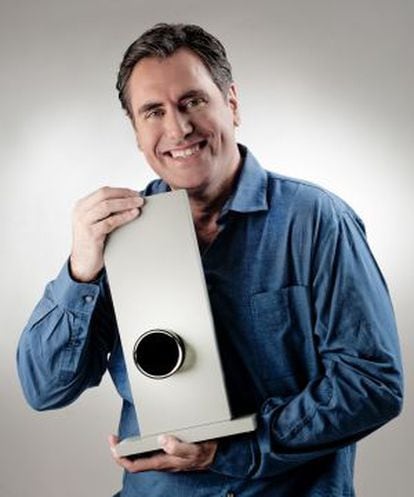The Spaniard discovering the key to success in Silicon Valley
Gabriel Bestard’s innovative keyless lock is set to go on sale in the United States in November

A couple of summers ago, riding around his native Barcelona aboard a clapped-out scooter, Gabriel Bestard scratched the screen of his smartphone, which was stuffed into his pockets along with his keys, loose change, and other abrasive items. Wondering what he could leave at home, he suddenly realized it might be possible to live in a keyless world, one in which locks could be opened with a smartphone app.
The idea captured his imagination, and a year later, the then-40-year-old decided to quit his job as marketing director at a dairy company and head for Silicon Valley to unlock its potential.
Bestard started work on Goji, as he calls the project, in Spain. “Everybody told me it was a great idea, but when I asked if they would buy it, they all said no,” he explains, adding that he even went back to the business school where he had done his MBA. “They told me that it made no sense and that at most we might be able to open doors using a voice command, but never with a smartphone.” His decision to head for San Francisco was further validated when he realized that European legislation and lock systems meant he needed a bigger market.
“I had already studied in Chicago, so I felt comfortable in the United States, and decided to head for the west coast, where the world is being changed,” he adds.
Each morning he sets off for his office in a coworking space filled with other hopefuls in search of start-up capital. The secret of success, he says, is to have an idea that can be explained to a possible investor quickly and simply. “Things are very different here. In Spain people looked at me like I was crazy. But here, if somebody says they trust you, then you are on your way.”
In Spain people looked at me like I was crazy”
He built his first prototype with the help of friends and $300,000 he raised through crowdfunding site Indiegogo. The lock system is hidden behind a tinted glass screen and the app is activated via Bluetooth by holding a smartphone against it. The battery lasts for a year, and in case of mishaps, there is a hidden lock that can be opened with a key. The app can be programmed to allow specific people in at certain times of the day.
The lock also includes a camera that takes a picture of anybody who approaches it, sending the image to the owner’s phone. “It’s another way of knowing who is coming and going,” he explains. In the same way that Instagram has made Polaroid or Kodak photos redundant, Uber is disrupting the taxi industry, or DocuSign eliminating paper contracts, Bestard wants Goji to consign keys to the past.
Bestard is unusual among the Spaniards working in the Valley in that he specializes in hardware, devices, rather than software. The largest concentration of Spaniards is to be found in RocketSpace, home to the Spain Tech Center. Turnover is high, and most people barely last 12 months. The Center has produced two success stories: Ludei, a games platform for smartphones and tablets created by Eneko Knorr; and Chartboost, a platform headed by María Alegre that helps mobile game developers find new users and monetize their games.
Goji will go on sale in November in the United States at selected outlets, among them Home Depot, Best Buy, and Staples, and retails for $299. But Bestard says the key to success could be the hotel market, “and why not a deal with accommodation website Airbnb as well?” he adds.










































